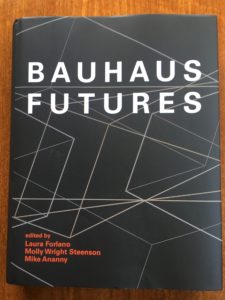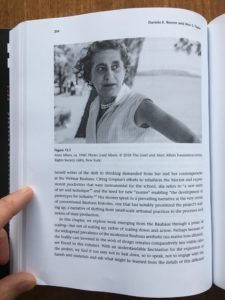This chapter examines the processes of scaling made visible within the words and work of the Weimer Bauhaus and, particularly, Anni Albers’ careful accounts of weaving. We explore whether threading a feminist precarity into her writing helps illuminate new ways of examining tensions between what we scale up and what we scale down.
Reading with Anni Albers:
The weave as a lively involution of scale, affect, and feminist precarity
Moving first over and across, we examine Alber’s discussions of different scales of weaving, from the hand loom to industrial machinery. Traversing then downward and below, we consider Alber’s attention to the body, those fingers and hands interlacing threads along a pliable plane. Shifting around and through, we consider how an affect is present in Alber’s reflections, and especially in how it pulls against the sturdy mechanistic logics visibly organizing her process. Across this writing, we hope to think with Albers, reading her prose somewhat against the grain of conventional Bauhaus accounts by interweaving a feminist positioning.
(2019) Special issue on hybrid pedagogies editorial, Digital Creativity 30(4), p. 13–217, url, doi:10.1080/14626268.2019.1699576
(2019) Reading with Anni Albers: The Weave as a Lively Involution of Scale, Affect, and Feminist Precarity, Bauhaus Futures, Laura Forlano, Molly Wright Steenson, Mike Ananny (ed.), p. 201–212, Cambridge, MA: MIT Press, pdf

